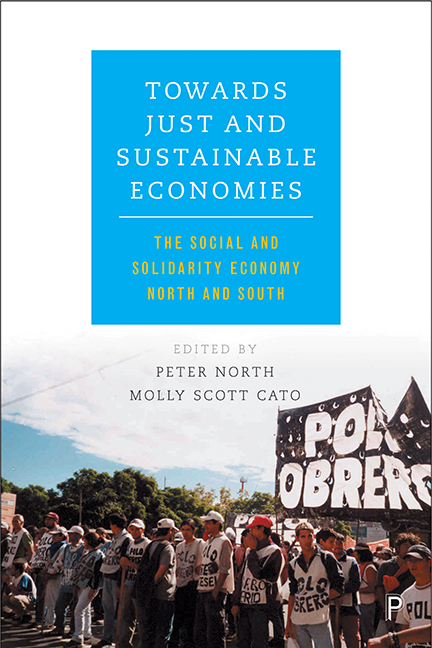Book contents
- Frontmatter
- Dedication
- Contents
- List of figures and tables
- Notes on contributors
- Acknowledgements
- One Introduction: new economies North and South – sharing the transition to a just and sustainable future
- Part I Theoretical perspectives on the social and solidarity economy
- Part II The social and solidarity economy as a site of social innovation
- Part III The social and solidarity economy and the state
- Part IV Policy translation between North and South
- Index
Twelve - Twenty-first century socialism? Venezuela’s solidarity,social, popular and communal economy
Published online by Cambridge University Press: 05 April 2022
- Frontmatter
- Dedication
- Contents
- List of figures and tables
- Notes on contributors
- Acknowledgements
- One Introduction: new economies North and South – sharing the transition to a just and sustainable future
- Part I Theoretical perspectives on the social and solidarity economy
- Part II The social and solidarity economy as a site of social innovation
- Part III The social and solidarity economy and the state
- Part IV Policy translation between North and South
- Index
Summary
Introduction
Perhaps the country whose experiences have inspired solidarity economy practices more than any other is the Venezuela of President Hugo Chávez. The 1999 Constitution defined Venezuela as a ‘participatory and protagonistic’ democracy, advocating more direct participation and aimed at creating a ‘humanist and solidaristic economy’. In 2006, the idea of participation was officially defined in terms of popular power, revolutionary democracy and socialism, which is defined as ‘21st century socialism,’ because it does not follow pre-established guidelines or any one ideology but is under constant development, and includes a wide range of groups and organisations with structural, social and political differences (Azzellini, 2009b). The process of seeking and building 21st century socialism is guided above all by values such as collectivity, equality, solidarity, freedom and sovereignty (MinCI, 2007, p 30) and aims to build a solidarity economy that includes all with dignity.
The Bolivarian process of social transformation is characterised by a ‘two-track’ approach (Zibechi, 2006): on one side, the state, the institutions and traditional left organisations, and on the other side, movements and organised society. It is a construction process ‘from above’ and ‘from below’. Unlike previous social transformation processes that defined the state as the central actor and motor of change, and considered self-organisation necessary only until the revolutionary party had seized the state, in Venezuela the central agents of change are now the movements, the organised people. The state's role is to support them by being facilitator of the bottom-up processes that will enable the movements and the people to implement the steps needed to transform society. The state has to guarantee the material content necessary for the realisation of the common wealth. This idea had been retiterated on various occasions by Chávez, and it is shared by part of the administration and by the majority of organised movements (Azzellini, 2013, 2017). In an interview with the author, Carlos Luis Rivero, then Vice Minister of the Ministry for Popular Economy, explained:
“We, as the state, do not see ourselves as representatives of the people. This is a society that must be constructed and led by its citizens in which the state must only be a promoter of that process of participation. But the state is not the transformative element.
- Type
- Chapter
- Information
- Towards Just and Sustainable EconomiesThe Social and Solidarity Economy North and South, pp. 213 - 232Publisher: Bristol University PressPrint publication year: 2017

